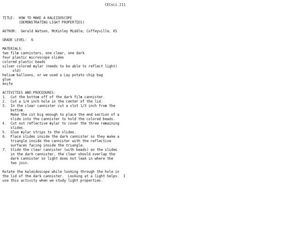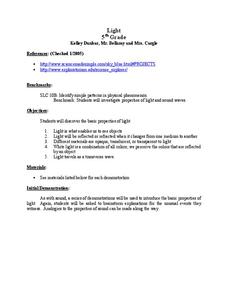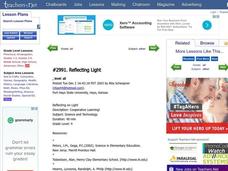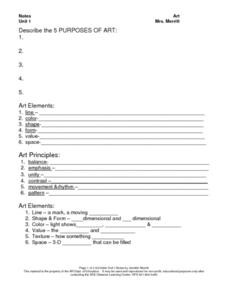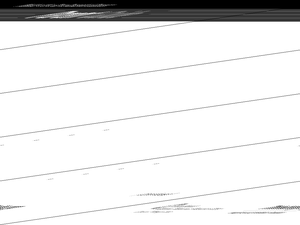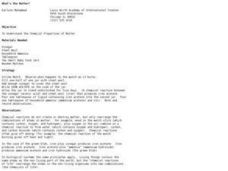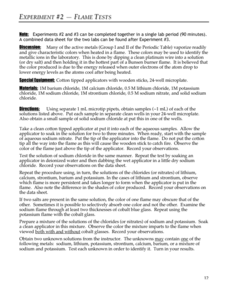Curated OER
How to Make a Kaleidoscope
Sixth graders create a kaleidoscope. In this light refraction lesson, 6th graders create a kaleidoscope to investigate the properties of light.
Curated OER
Light
Fifth graders sit in their seats with the lights on and then the teacher turns off the lights. After their eyes have adjusted, they vote on what colors of construction paper are being held up. The lights are then turned back on and...
NASA
The Electromagnetic Spectrum
Did you realize the visible light spectrum is less than three percent of the electromagnetic spectrum? A hands-onlesson includes five activities and experiments for scholars to explore and discover many advanced science concepts. They...
Curated OER
Reflecting Light
Students are introduced to the reflective properties of light and use mirrors to make light from a source reflect onto a specific target. They take turns and record the amount of time it took to correctly reflect the light.
Curated OER
Notes Unit 1: Art Fundamentals
Here is a guide for your middle schoolers to use while you are providing a lecture on the basics of art. They use this worksheet to aid them as they take notes on the purpose of art, art elements, properties of art, and art principles....
Curated OER
Is it Permeable?
The question is posed, is it permeable or impermeable, it's up to your critical thinkers to determine the answer. This presentation provides several scientific concepts related to permeability and the properties of matter alongside...
Curated OER
Preservation and the Power of Light
Students identify the effect of light on objects. In this scientific inquiry lesson, students use a chart to write a hypothesis about what will happen when colored construction paper is left in sunlight. Students observe and discuss the...
Curated OER
Stations of Light
Student groups rotate through four stations to examine light energy behavior: refraction, magnification, prisms and polarization. They see how a beam of light is refracted (bent) through various transparent mediums. Young scholars...
Curated OER
Electric Gameboards
Students explore the properties of electricity. In this electricity lesson, students construct an electric game board circuit using their knowledge of a series electrical circuit. Students develop game ideas based on current...
Curated OER
Water Works Wonders
Students examine where water is found in the world, how we use it, and the various forms it takes. They observe the refraction of light through a prism, record the day and night sky over a week's time, and create a topographic model of...
Curated OER
Rain and Rainbows
Students explore the weather system by analyzing water properties. In this precipitation lesson, students review weather related vocabulary terms and discuss how rainbows are created by light hitting droplets at the right time. Students...
Curated OER
Air Is there
Young scholars experiment to observe air and its mass. In this air lesson, students use the scientific method to complete experiments that demonstrate the properties of air. Young scholars view a video as follow-up.
Curated OER
Surface Tension of Water
First graders observe the surface tension of water. In this water properties lesson, the teacher defines surface tension, then guides students through eight experiment that illustrate surface tension.
Science 4 Inquiry
Battle of the Waves
Which travels faster, light or sound? Scholars work in groups to simulate the ability for waves to travel through solids, liquids, gases, and through a vacuum. Then, they learn about the properties of a mystery wave and must determine...
Mathematics Assessment Project
Deducting Relationships: Floodlight Shadows
Try to figure out what happens with shadows as a person moves between two light sources. A formative assessment lesson has individuals work on an assessment task based on similar triangles, then groups them based on their...
Curated OER
Light, Sound and Energy
The students will be given opportunities to work independently and in teacher-directed situations to study and discover the many facets of light and sound, and the uses of energy in our environment. The grade 4 students will learn the...
Curated OER
Properties of Matter
In this properties of matter worksheet, students answer 11 questions about the various properties of matter such as density, elasticity, malleability, and how hard or brittle a substance is.
Cornell University
Exploring Rocks and Minerals
Investigate the properties of rocks and minerals through a rockin' hands-on activity. Learners test rocks for various properties and, using a guide, attempt to identify different samples. They use various properties including hardness,...
National Academy of Sciences
Lights at Night Webquest
Help learners find ways to become more efficient energy consumers. To start, individuals research how different countries address energy efficiency and then analyze their own carbon footprint. They use their research to identify ways to...
Curated OER
What's the Matter? (Living and Non-Living Things)
Understand how chemical reactions recombine atoms to create the "chemicals of life". An experiment, showing the basic chemical reactions of an iron nail or a match, helps young children start their understanding of permanent changes.
Pingry School
Flame Tests
Light a fire in your pupils! Scholars conduct a flame test and observe the emission spectra of several different salts in an enlightening hands-on investigation. They use their observations to make comparisons and conclusions about the...
Curated OER
My World is Upside Down
Students observe a demonstration on light. They construct a pinhole viewer, and explore and discuss the concept that light travels in a straight line.
Curated OER
How Light Moves
Young scholars study the movement of light. In this light lesson, students work in groups to participate in a light and shadow walk around their neighborhood. Young scholars brainstorm rules for light movement and watch videos about...
Curated OER
Light
Students observe how light can be reflected, refracted, and absorbed. In this light lesson, students discover that light travels in a straight path. This lesson contains a "bonus" activity that explains how to make a kaleidoscope.
